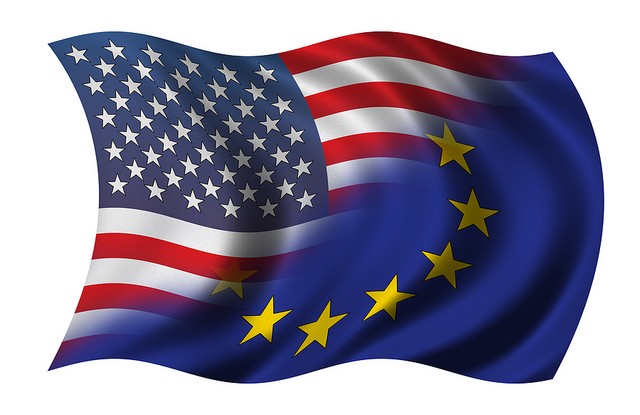By Megan Darby
Protest is ramping up against a transatlantic trade treaty critics say could weaken environmental protection.
The Transatlantic Trade Investment Partnership is intended to boost commerce between Europe and the US , by cutting tariffs and aligning regulations.
Green groups on both sides of the ocean have expressed fears this could mean watering down environmental safeguards and increasing fossil fuel consumption.
A national day of action is planned for today [Saturday 12 July] in the UK to highlight concerns with the TTIP ahead of further negotiations in Brussels next week. This will include a protest outside the business department building in London .
The UK Green Party, which supports the protests, said the TTIP was a “corporate power grab” that “must be stopped”.
Keith Taylor MEP said: “Though huge chunks of this trade deal are shrouded in secrecy what we do know is that TTIP poses a very real threat to the quality of life of people in the UK .
“This deal, favored by multinationals, threatens to slash regulations that protect our environment and health. But, most worryingly, it represents a serious threat to democracy in our country.”
It follows an anti-TTIP demonstration in Brussels two months ago that resulted in 240 arrests.
Climate impact
One concern of greens is that loosening regulations could increase oil and gas exports from America , increasing European reliance on polluting fossil fuels.
A European position paper leaked earlier this week endorsed lifting restrictions on trade in gas and crude oil. It argued this would help with security of supply, an increasingly hot topic since tensions in the Ukraine highlighted Europe ‘s heavy dependence on Russian gas.
Natacha Cingotti, campaigner for Friends of the Earth Europe, said: “This leaked proposal further confirms our concerns that, while the public is being kept in the dark, the EU-US trade deal is being used to trade away regulations that protect us from dangerous climate change…
“ Europe needs to end its high import dependency and make an urgent transition to clean, renewable energy and greater energy efficiency.”
US grassroots environmental network the Sierra Club also raised concerns. Ilana Solomon, director of its responsible trade program, said: “The EU wants a free pass to import dirty fossil fuels from the US , a run-around US law that would result in more dangerous fracking for oil and gas in our backyards and more climate-disrupting pollution globally.”
Steve Kretzmann, executive director of Oil Change International, called the proposals “climate denial, pure and simple”. German-based Power Shift executive director Peter Fuchs said communities and the environment would suffer.
German think-tank the Heinrich Boll Foundation, in contrast, said in a report the treaty presented an opportunity to phase out fossil fuel subsidies [FFS]. That would benefit low carbon sectors.
In principle, the European Commission has argued, increased economic cooperation should facilitate greater climate and environmental protection.
In practice, the think-tank pointed out a 2013 impact assessment from Brussels predicted an 11.8 million tonne increase in carbon emissions, in the most liberalized scenario.
The report added: “In the absence of FFS reform, the TTIP will be a step in the wrong direction.”
Precautionary principle
The other core concern for European environmentalists is the treaty could erode the precautionary principle. This is the tenet, long held in Europe , that an action or policy must be proved not harmful before it goes ahead.
In America , on the other hand, it must normally be proved something is harmful before it can be banned.
The philosophical divide is one reason that shale gas fracking has been slower to take off in Europe than the US , for example.
Blogging for the European Greens’ campaigning website against TTIP, MEP Jose Bove said: “Under TTIP, big business is teaming up on both sides of the Atlantic to challenge the precautionary principal, claiming it creates unnecessary ‘technical barriers to trade’. We are fundamentally against this dangerous assumption.
“If anything, we need to do more in the EU to safeguard our citizens and our environment from untested or risky substances or processes.”
The European Commission acknowledges the different approaches on its TTIP website, but insists the high level of environmental protection in Europe is “non-negotiable”.
“Both the EU and the US are committed to high levels of protection for our citizens, but we go about it in different ways. The EU sometimes relies more on regulations, the US more on litigation. Both approaches can be effective, but neither is perfect,” it says.
“This is not a race to the bottom. Making our regulations more compatible does not mean going for the lowest common denominator, but rather seeing where we diverge unnecessarily.”
Transparency
Protestors’ concerns around the treaty have been compounded by a perceived lack of transparency around the negotiations, which are led by unelected officials.
The Corporate Europe Observatory accused the European Commission of favoring big business in its consultations around the treaty. It found that of the 560 lobbyist meetings and communications the Commission had with stakeholders, 92% were with business and just 4% with public interest groups.
Pia Eberhardt, trade campaigner at the Corporate Europe Observatory, said: “[The trade directorate] actively involved business lobbyists in drawing up the EU position for TTIP while keeping ‘pesky’ trade unionists and other public interest groups at bay.
“The result is a big-business-first agenda for the negotiations which endangers many achievements that people in Europe have long struggled for, from food safety rules to environmental protection.”
A European Court of Justice ruling last week could result in more TTIP documents being made public, but a lawyer told Euractiv it was a “modest step forward”.
The sixth round of negotiations on TTIP takes place in Brussels from 14 to 18 July.
12 July, 2014
© RTCC

